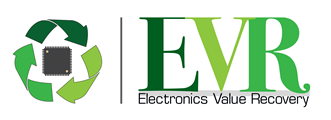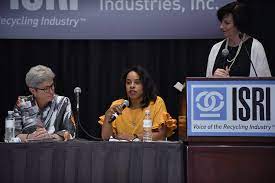A Unique Start
Anna Tompkins, Commercial Director at Sims Metal, has been working in the recycling industry for 18 years. While many women entered recycling as part of a family business, Tompkin’s path is unique. She was working for an occupational health company and visited Montgomery Scrap Corp., a metal recycling yard. A few weeks after the visit, Montgomery Scrap invited her back and “made an offer she couldn’t refuse.” When they merged with United Iron and Metal, she was promoted to Client Relations Manager, and later Director of Marketing. This merger created Atlantic Recycling Group and when Sims Metal acquired them, Tompkin’s new title became “Commercial Director.”
Tompkins notes that an obstacle preventing women from pursuing careers in the scrap industry is that it is not glamorous. Moreover, while there have been articles about kids wanting to grow up to drive a trash truck, I haven’t heard of any wanting to be “a recycler.” There are few role models period, let alone female role models.
Tompkins joined the Association of Women In the Metal Industries (AWIM) for this very reason. She rarely met women in day-to-day operations. Even though her employers have been very supportive, it is still a male dominated industry. AWIM’s mission is to provide women in the industry with networking, educational and mentoring opportunities.
The Paperstock Industry
The paper recycling industry has a similar history. The first time I attended American Forest & Paper Association’s “Paper Week” meeting, it seemed like there were a million men and no women. Recognizing the need for a stronger voice within the industry, the National Association of Paperstock Women (NAPW) was formed in 1988. It was led by Nini Krever, then the owner of Traders International.
Krever followed her father into the industry. She was teaching French and occasionally did some translation work for her father’s paper brokerage business. She decided to join him full time but unfortunately he died shortly thereafter. Not to be discouraged, she hired a retired veteran of the industry. She believes he gave her the credibility she needed in the male dominated industry. Krever thinks some of the customers assumed she was the secretary but she didn’t care. “As long as long as I was learning and we were getting orders” she says.
The Scrap Yard
In a 1991, Beth Rogers interviewed three female leaders in the scrap industry for the Institute of Scrap Recycling Industries (ISRI). The first interview was with Jane Perlman. Perlman was motivated to take over her family’s scrap yard when first her father, then her uncle died. The local newspaper penned the headline “Demise of Perlman Firm.” She called the paper and informed them that “her gender had nothing to do with the running of a 76-year old family business.” Even her family wasn’t supportive at first. A “junkyard wasn’t a place for women,” an attitude prevalent throughout the industry.
Like Krever and Perlman, Shelley Padnos entered the industry when she joined the company founded in 1905 by her grandfather. The business was a family affair with typical family photos interspersed with photos of the family at the scrapyard. Women were accepted in the business and her grandmother ran the company for a period when her grandfather was ill. Padnos worked there through high school and during summer breaks from college. At the time of the interview, she was the Executive Vice President of the firm as well as the first woman to hold a national office with ISRI.
“Not A Place for Women”
I identify with these women pioneers in our industry. As a foreigner living in Greece, I needed a work permit unless I worked for “the” family business. The family business was paper recycling but my father-in-law wouldn’t let me because “it’s not a place for women.” Five years later, we returned to the US and started a paper recycling business. My mentor was a woman, Dr. Rosalie Green, recycling coordinator for Fairfax Co., VA. Initially I was only going to help to get the business started. But as Tompkins told me, “it gets in the blood.” Maryland had just passed the Maryland Recycling Act of 1988. Two years later “Earth Day 1990” was a huge celebration for the 20th anniversary of the founding of Earth Day. Before I knew it, recycling became my passion.
All of these women agree – women can do any and all of the jobs in the industry and can find it a challenging, exciting and rewarding career. As Tompkins was told when first hired, “you’ll know in nine months if this business is for you. You’re either going to love it and stay, or you’re going to move on.”
Family-owned yards are bringing their daughters into the industry, building the next generations. When some of these yards are acquired by larger corporations, women are retaining and assuming managerial roles. Scrap yards may not have been a place for women in the past, but they are no longer “Taboo.” Today, they are integral and valued members of the recycling industry community.
For more on Women In Recycling visit ISRI’s interview, President and CEO of the Canadian Association of Recycling Industries.
Notes:
Credit to Beth Rogers for her 1991 article in ISRI’s publication Scrap
NAPW is no longer a functioning organization. ISRI’s Women In Recycling Council is comprised of women from all areas of the recycling industry.

